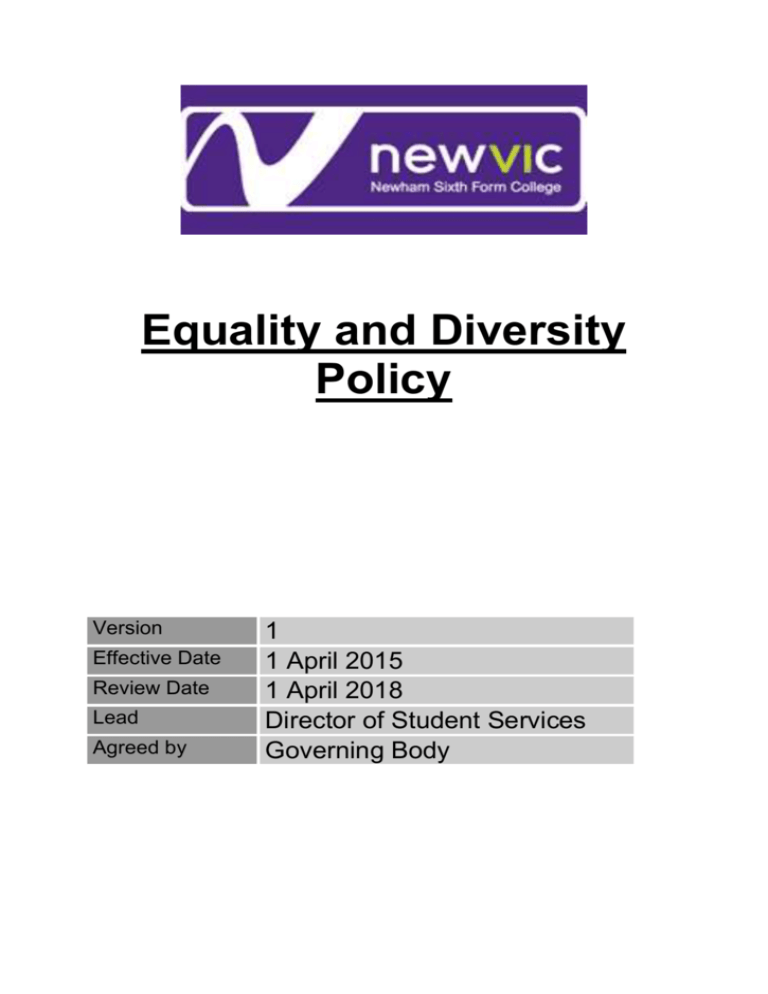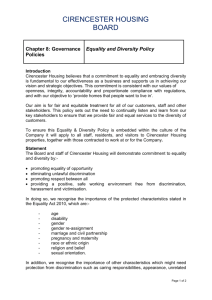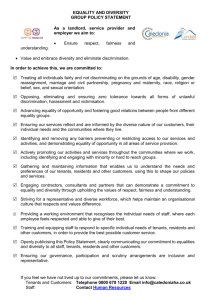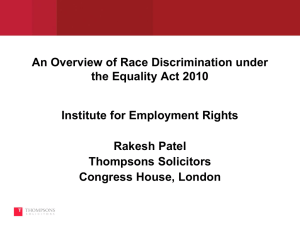Equality and diversity policy
advertisement

Equality and Diversity Policy Version Effective Date Review Date Lead Agreed by 1 1 April 2015 1 April 2018 Director of Student Services Governing Body 1. Policy Statement 1.1 The College aims to be a welcoming, inclusive college for all who learn, work or use our services. We believe in respect for everyone; we want to develop our community by valuing diversity and advancing equality. 1.2 Our aim is to ensure that everyone who works and learns at the College achieves their full potential in an inclusive environment free from discrimination. This is regardless of age, race, gender, disability, sexual orientation, marriage and civil partnership, gender reassignment, pregnancy and maternity, religion and belief, nationality, family circumstances, economic and social background, union activity, and employment status. 2. Scope 2.1 This policy applies to all members of the College, including governors, staff, students and people using our services. The policy is also binding on our external contractors, employers and other partners with whom the College collaborates. Unless otherwise stated, all references to staff include potential employees, former employees, full-time and part-time employees, as well as sessional workers, agency workers, temporary workers and contractors. 3. Policy Summary 3.1 This policy sets out how we deliver equality and meet our legal requirements. It establishes clear responsibilities for governors, staff, students and other stakeholders to ensure that all are aware of their collective and individual duties under legislation. We will build on this legal compliance to achieve excellence for our students and staff. 4. Policy Details 4.1 This policy responds to the Equality Act 2010, including the public sector equality duty and accompanying specific duties. It also responds to the Special Educational Needs and Disabilities (SEND) Reforms of the Children and Families Act 2014. 4.2 The nine protected characteristics established in the Act are age, race, gender, disability, sexual orientation, marriage and civil partnerships, gender reassignment, pregnancy and maternity and religion and belief. 4.3 The public sector equality duty means that in the exercise of our functions, the College must have due regard to the need to: eliminate discrimination, harassment and victimisation; advance equality of opportunity between people who share a protected characteristic and those who do not; foster good relations between people who share a protected characteristic and those who do not. 4.4 In the case of marriage and civil partnership, public authorities need to have due regard to the need to eliminate unlawful discrimination against someone because of their marriage or civil partnership status. However, the other aims (advancing equality and fostering good relations) do not apply to this characteristic. 4.5 The College will publish information to demonstrate our commitment and compliance with the specific equality duties across our functions on an annual basis. We will also prepare and publish equality objectives and details of engagement undertaken to achieve these objectives at least every four years. 5. Responsibilities 5.1 Governors are responsible for: 5.1.1 Ensuring that the strategic direction of the College supports advancing equality and diversity. 5.1.2 Ensuring the College meets all its legislative duties, including the general and the specific duties of the Equality Act 2010, the SEND reforms of the Children and Families Act 2014 and all subsequent legislation. 5.1.3 Reviewing progress on advancing equality and diversity on an annual basis and through the link governor visits. 5.1.4 Holding the College Management Team accountable for the implementation of this policy. 5.1.5 Striving to ensure that the membership of the body of governors and advisors reflects the diversity of the student community at the College. 5.2 The College Management Team is responsible for: 5.2.1 Promoting a welcoming, inclusive college for all, showing respect for everyone, valuing diversity and advancing equality. 5.2.2 Implementing the Equality Act 2010, including the general and specific duties, the SEND reforms of the Children and Families Act 2014, and all subsequent legislation, and the Equality and Diversity Policy. 5.3 5.2.3 Ensuring staff and students understand their responsibilities and are given appropriate support and training to enable them to carry out their duties. 5.2.4 Ensuring equality and diversity monitoring is integrated into quality assurance processes 5.2.5 Impact assessing policies, major plans and procedures, to identify areas for improvement and then to make changes to ensure we are implementing our values as well as complying with the law. All staff are responsible for: 5.3.1 Promoting a welcoming, inclusive college for all, showing respect for everyone, valuing diversity and advancing equality. 5.3.2 Behaving in a way which does not discriminate against, victimise, bully or harass any individual or group (as in 1.2 above); this includes on social media. 5.3.3 Challenging inappropriate or discriminatory behaviour. 5.3.4 Reporting incidents of discrimination, victimisation, bullying and harassment. 5.3.5 Contributing to self-assessment reporting on how equality and diversity are advancing in their areas. 5.3.6 Participating in equality and diversity training. 5.3.7 Fully integrating and embedding equality and diversity in their delivery of services. 5.3.8 Fully integrating and embedding equality and diversity within curriculum planning and teaching, learning and assessment. 5.3.9 Regularly reviewing the promotion of equality and diversity in individual subject areas and improving the opportunities identified in schemes of work. 5.3.10 Developing schemes of work, lesson content and resources which recognise and promote inclusion. 5.4 Students are responsible for: 5.4.1 Promoting a welcome, inclusive college for all, showing respect for everyone, valuing diversity and advancing equality. 5.4.2 Behaving in a way which does not discriminate against, victimise, bully or harass any individual or group (as in 1.2 above); this includes on social media. 5.4.3 Reporting incidents of discrimination, victimisation, bullying and harassment to their tutor or other member of staff. 5.5 Our expectations are that all who work in partnership with us in any capacity (for example, parents/carers, contractors, work experience employers, hirers of our premises, external speakers and trainers) agree to: 5.5.1 Show respect for everyone, valuing diversity and advancing equality. 5.5.2 Behave in a way which does not discriminate against, victimise, bully or harass any individual or group. 5.5.3 Behave in a way that does not contravene the College’s Equality and Diversity Policy or the law. 6. Complaints 6.1 The College’s Complaints Procedure, Bullying and Harassment Policy and Grievance Policy have details of the informal and formal processes that the college operates to deal with complaints relating to equality and diversity. 7. Breaches of this policy 7.1 Any student who is found to have breached this policy may be dealt with under the College’s Student Learning and Behaviour Policy. 7.2 Any member of staff who is found to have breached this policy may be dealt with under the College’s Misconduct and Disciplinary Policy. 7.3 The College will also take seriously any malicious, or in our opinion, unwarranted allegations of discrimination, victimisation, bullying and harassment and will take appropriate disciplinary action where necessary. 8. Policy Monitoring and Review 8.1 The effectiveness of the policy will be monitored by the lead for equality and diversity in the Senior Leadership Team. 8.2 This policy will be reviewed every three years. Where necessary, the review will be more frequent to ensure compliance with current legislation. 9. Legal Considerations and Relationship with Other Policies 9.1 This policy should be read in conjunction with other College policies, in particular (this is not an exhaustive list): Admissions Policy Bullying and Harassment Policy Complaints Procedure Misconduct and Disciplinary Policy Flexible Working Policy Grievance Policy Recruitment and Selection Policy Freedom of Expression Statement Appendix A: Forms of Discrimination The following are forms of discrimination that this policy aims to avoid: 1. Direct Discrimination occurs when a person is less favourably treated than another because of a protected characteristic or the fact that they are a part-time worker or fixed term employee. 1.1 Associative Discrimination is where an individual is directly discriminated against or harassed for association with another individual who has a protected characteristic (although it does not cover harassment because of marriage and civil partnership, and (according to guidance from the Government and Acas) pregnancy and maternity). 1.2 Perceptive Discrimination is where an individual is directly discriminated against or harassed based on a perception that he/she has a particular protected characteristic when he/she does not, in fact, have that protected characteristic (other than marriage and civil partnership, and pregnancy and maternity). 2. Indirect Discrimination is where a provision, criterion or practice is applied that is discriminatory in relation to individuals who have a relevant protected characteristic (although it does not explicitly include pregnancy and maternity, which is covered by indirect sex discrimination) such that it would be to the detriment of people who share that protected characteristic compared with people who do not, and it cannot be shown to be a proportionate means of achieving a legitimate aim. 3. Victimisation occurs where someone is treated less favourably than others because he/she has made or supported a complaint or raised a grievance under the Equality Act 2010 or taken legal action, in relation to any alleged act of unlawful discrimination, against the College or because he/she has supported someone else in doing this or because he/she is suspected of doing so. 4. Harassment is where there is unwanted conduct, related to one of the protected characteristics (other than marriage and civil partnership, and pregnancy and maternity) that has the purpose or effect of violating a person’s dignity; or creating an intimidating, hostile, degrading, humiliating or offensive environment. It does not matter whether or not this effect was intended by the person responsible for the conduct. The College has a separate Harassment Policy and procedure for dealing with complaints of harassment. 5. Disability Discrimination There are special provisions, which protect disabled employees and job applicants against discrimination in the workplace. The College will ensure that employment policies and practices fully comply with these provisions and will consider making appropriate reasonable adjustments to ensure that disabled applicants or employees are not substantially disadvantaged.









